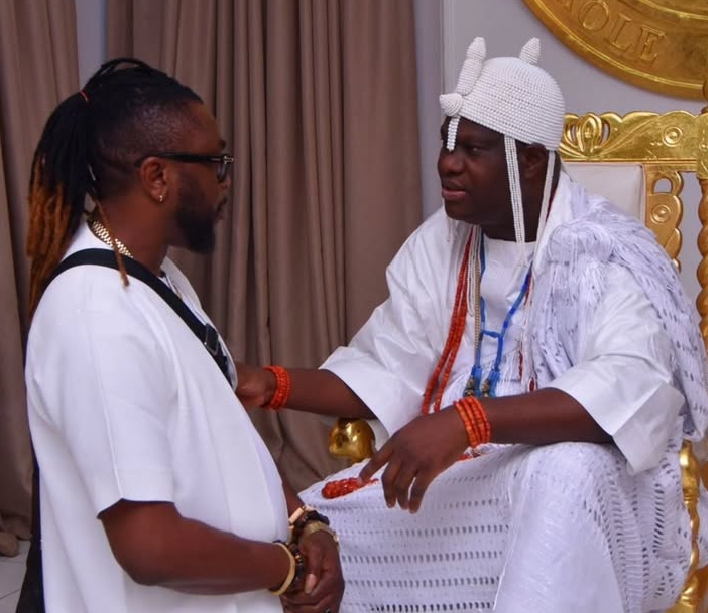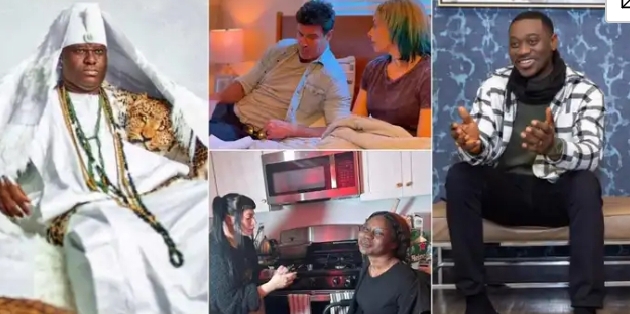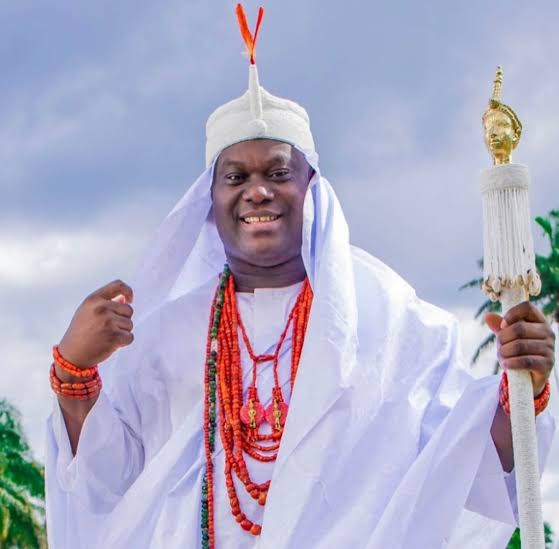In the gilded world of Hollywood, royalty is usually fictional, constructed through tiaras, fairy tales, and special effects. But in one unprecedented moment in modern cinema, real royalty stepped in, not to lend his crown to fiction, but to embody a bridge between African heritage and global storytelling.
That monarch was His Imperial Majesty, Ọba Adeyeye Enitan Ogunwusi, Ojaja II, the 51st Ooni of Ife, spiritual head of the Yoruba people and custodian of one of the oldest surviving monarchies in Africa. And in a quiet, remarkable cameo in a Hollywood project, the Ooni of Ife made history.
Not many expected to see a traditional ruler from Ile-Ife—the spiritual capital of the Yoruba race—grace the screen of an American-produced movie.
But when it happened, it wasn’t just a novelty; it was a powerful symbol. It marked a turning point in the evolving dialogue between African royalty and modern global platforms.
WHO IS THE OONI OF IFE?
A Reign Born from Ancestral Thrones
Born: October 17, 1974
Reign began: December 7, 2015, as the 51st Ooni of Ife
Heritage: Direct descendant of Oduduwa, conferred through the Giesi dynasty of Ile-Ife
Education & Career: Accounting degree; real estate entrepreneur before ascending the throne

A Vision of Cultural Diplomacy
Oba Ogunwusi’s reign has been defined by one guiding mission: to reignite global consciousness of Yoruba heritage—not as folklore, but as a living, breathing identity. He has:
- Led naming and spiritual ceremonies for diaspora returnees
- Advocated for stronger pan-African cultural ties
- Visited Afro-religious communities in Brazil, Cuba, and the U.S.
- Championed youth empowerment, tourism, and heritage preservation in Nigeria
But stepping into a film was unexpected—even revolutionary.
WHO PRODUCED TAKE ME HOME? ALFRED OLADOTUN TAYLOR—THE HISTORIAN AS STORYTELLER

Take Me Home is a 2023 project conceived and produced by Ambassador Alfred Oladotun Taylor, also known as Dotun Taylor or Asoju Asa Ọdùduwà
A historian-turned-filmmaker, Taylor leads the Roots & Heritage Renaissance Culture Initiative, working to deepen diasporan reconnection through cultural media .
Taylor has overseen cross-continental cultural tours, visits, and events, including trips that bring African-Americans to Ile-Ife .
Take Me Home is his cinematic expression of that work—a horror-comedy spiritual journey framed around Halloween, built on a $100K budget and featuring Nollywood and Hollywood stars
What the Ooni Did On Screen

He appears briefly, but powerfully in his real throne room, dressed in ceremonial regalia.
His role involves no scripted lines, no dramatics, only presence: a cultural and spiritual acknowledgment of both the character and diaspora.
Sources describe it as “a cameo appearance of the Ooni of Ife.
WHAT IS TAKE ME HOME ABOUT? A SPIRITUAL QUEST WITH MODERN ANGST
Plot Premise
Centers on an African-American protagonist and her family’s supernatural experiences after connecting with stolen Yoruba relics
Blends horror, spiritual realism, and suspense—all anchored in ancestral identity and repatriation themes
Transnational Casting
The ensemble gives the film global texture:
Nigerian actors: Lateef Adedimeji, Bayo Bankole (“Boy Alinco”)
Hollywood cast: Dave Sheridan, Felissa Rose, Amber Rivette, and Mefi Black
Cultural appearances: Alfred Oladotun Taylor (also on-screen) and the Ooni of Ife himself

A KING IN A KINGDOM—FILMING IN ILE-IFE
Why Ile-Ife Matters
Considered the cradle of Yoruba civilization; spiritual birthplace of Oduduwa
Holds geopolitical, religious, and cultural centrality for Yoruba identity
Production on Sacred Ground
Led by Taylor and palace authorities, the production was carefully staged within Ile-Ife’s royal palace, shrines, and groves
Cultural protocols were observed, and Yoruba priests advised on preserving spiritual authenticity
The Ooni’s appearance took place in his throne room—no acting, only presence
A MOMENT OF SPIRITUAL VALIDATION
In Take Me Home, the protagonist—and by extension the diasporan viewer—receives a verbal blessing from the Ooni, an act of ancestral recognition. This is not theatrical, but ceremonial: a monarch acknowledging the fragment of lineage in the hallowed city of origin.
Oba Ogunwusi’s words echo across centuries:
“If you take a closer look…there is no difference between us… your source (Ile‑Ife) is filled with lovely people”
WHY IT RESONATES—AND FOR WHOM

Diasporan Yearning
For millions of people descended from African enslaved populations, Take Me Home mirrors lived longing: reconnection with roots, reclaiming ancestral memory, spiritual repatriation.
Scholarship and Spirituality
Rooted in Yoruba theology: egungun (ancestral spirits) are believed to be active in descendants’ lives. A king’s acknowledgment is a spiritual anchor.
Cinematic Symbolism
Unlike movies that exoticize African ritual or royalty, this film gives screen time to a real, currently reigning monarch—no fictionalization, no Hollywood gloss.
PRODUCTION STATUS AND RELEASE
Budget: Approx. $100,000
Post-production: Underway; sound and editing handled by a Hollywood team
Initial release window: Targeted for Halloween in the U.S., with Nigerian cinemas expected afterward
Screenings tied to heritage tours led by Taylor (e.g. Olojo Festival launches)
BROADER IMPACT AND LEGACY
Cultural Diplomacy in Motion
This film marks a departure from traditional cultural outreach. Instead of speeches or conferences, the Ooni uses cinema—an epicenter of cultural influence—to extend Yoruba heritage.
Potential Long-Term Effects
May catalyze growth in heritage filmmaking in traditional spaces like Yoruba palaces
Offers a model for diaspora reconnection through culture and media
Reinforces Ile-Ife as a spiritual hub, enhanced by narrative media
BEYOND CAMEO—A CROWNED MOMENT FOR CINEMA

Oba Adeyeye Ogunwusi’s cameo in Take Me Home is more than a filming choice—it’s an act of ancestral advocacy. A king entered his ancestral palace, looked into a diasporan’s eyes, and spoke. That moment belongs not only to film, but to memory, identity, and heritage.
This is the statement that says: Africa doesn’t need to be shown honorified, it needs to be shown honestly. And in those few unlit seconds, with no camera angles to flatter, the monarch simply was—heir and emissary, regal and real.
In cinematic history, there may never again be a moment quite as compact and profound.













Leave a comment